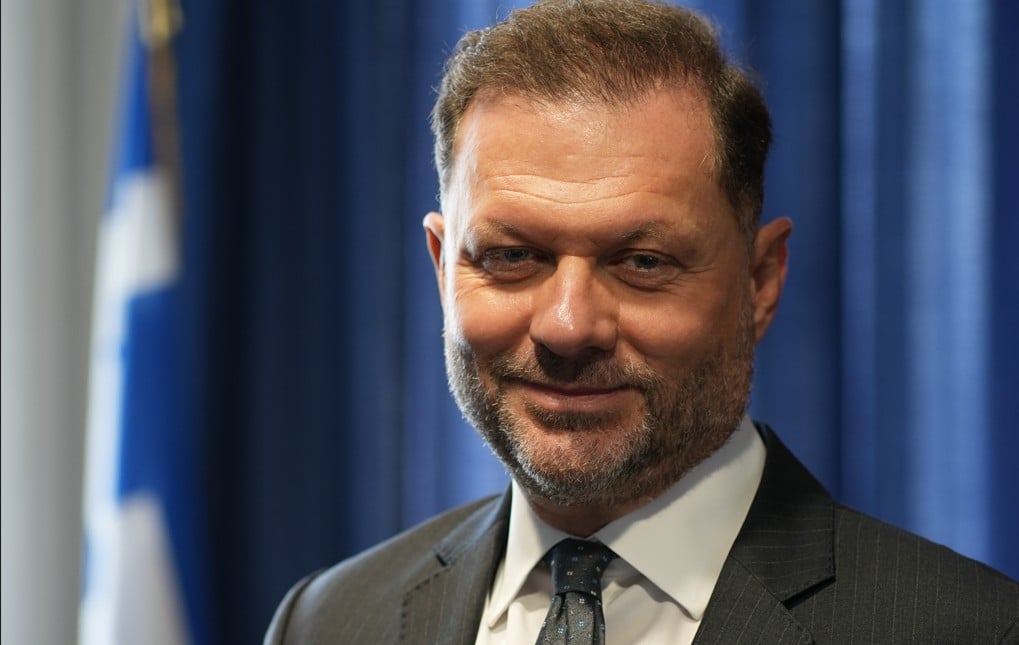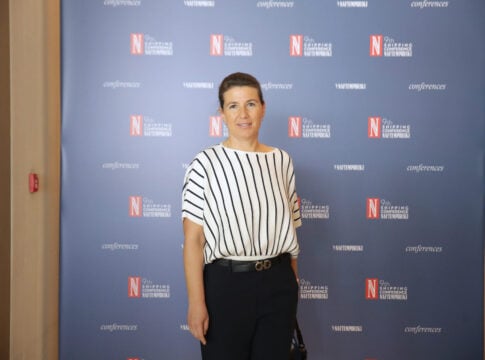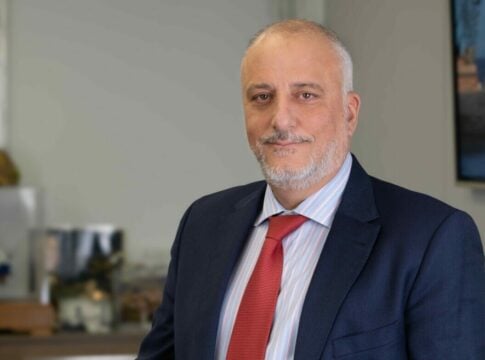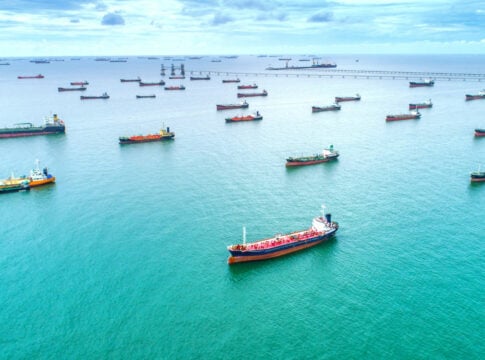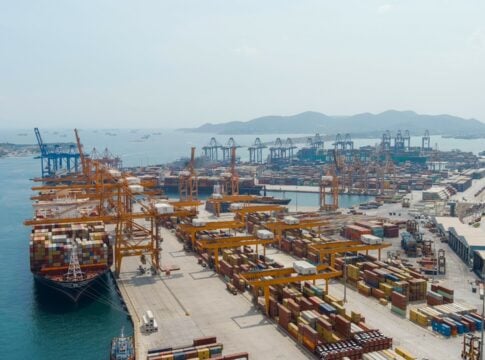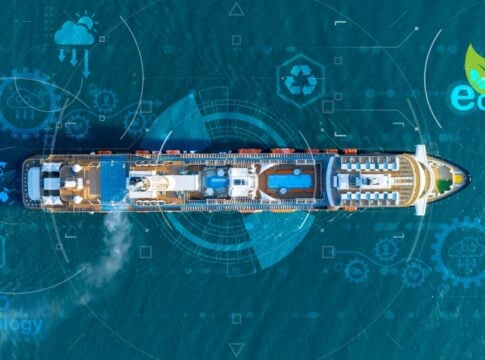ONEX has become a benchmark for the new era of Greek shipbuilding. With Syros and Elefsis at its core, the company’s investments are directly linked to energy security, shipping, defense and innovation.
The recent visit of US Secretary of the Interior Doug Burgum to Elefsis shipyards brought the project to the forefront of international interest. Panos Xenokostas, president and CEO of ONEX, spoke to “N” about the vision, partnerships and next steps.
Burgum’s visit to ONEX’s shipyards in Elefsis was described as a “landmark” for Greek-American relations. What was the message of the visit?
“This visit was not just a formal political move, it had substance and depth. It marked the recognition of the great effort we made to bring Greece back to the global shipbuilding map.
The presence of a minister from the Trump administration in the shipyards sent a message of confidence not only to ONEX, but also to the country as a whole: in its industrial potential, in its strategic position, in its prospects for becoming a pillar of stability in the Eastern Mediterranean.
For us, it is also an incentive to prove that we can deliver world-class work and strengthen strategic partnerships that will bring mutual benefits.
The main message, however, is that the future belongs to those who dare to envision and venture outside the ordinary. There is nothing impossible for those who will try, as Alexander the Great said.”
Can ONEX play a role in international defense and energy programs?
“Certainly. Our geographical location combined with sustainable and competitive development create added value in economic diplomacy.
Greece’s infrastructure is located in a place that can serve the naval forces of the Mediterranean, the energy projects of the region, as well as the diversified logistics needs of Southeast Europe.
Through ONEX’s HUB, we can offer solutions and utilize infrastructure that has either remained inactive or declined for decades.
With the investments and partnerships we develop, we aim to be at the forefront of programs that enhance energy security and the defense deterrent power of both our country and our allies.”
Mr. Burgum described ONEX as “an energy hub for the Balkans and Eastern Europe.” What does this mean in practice?
“It confirms our strategic plan: to make ONEX a regional hub in shipbuilding, while at the same time Greece will develop into an energy transit center with modern infrastructure.
Shipbuilding is a critical chain in the energy supply chain – from LNG carriers and tankers to offshore support vessels.
Our investments in Elefsis and Syros, together with the creation of an integrated logistics hub and the emphasis on new energy transition technologies, form an ecosystem that strengthens the security of supply for Greece and its neighbors.
This, combined with our ability to raise US and international capital, positions us in a leading role in the region.”
The Logistics and Innovation plan in Elefsis is particularly ambitious. How will it be implemented?
“We are creating a multidimensional hub that will connect shipbuilding with transport, energy, defense and technology.
It will act as a platform for high-tech companies, startups, universities, but also logistics providers.
Elefsis, in combination with Syros, can become a reference point for the Eastern Mediterranean and the Balkans.
For the local community, this means new jobs in dozens of specialties, from engineers and technicians to researchers and logistics executives.
This is a development model that is not limited to ship repair, but opens up new industrial and technological prospects.
The support of the two governments, Greece and the United States, in such critical investments, which concern society and independence, is a catalyst for acceleration.”
What are the immediate priorities and the schedule of the project?
“Our first priority is the upgrade of Elefsis, so that it can develop into a fully equipped shipbuilding center, as well as the further strengthening of Syros, which has entered the second phase of our plan.
The goal is for ONEX’s shipbuilding units to operate as a single entity and to be a choice of excellence for our customers.
In the immediate future, we are also focusing on coastal shipping vessels, tugs and auxiliary vessels, where increased demand is being recorded.
At the same time, design programs are being implemented for new generation commercial ships, competitive in the international market, as well as state-of-the-art offshore energy solutions.
In the defense sector, within five years, we aspire to see ships designed and built in Greece, with technology that offers autonomy and high added value.”
Energy and green transition and shipbuilding innovation: how are they implemented in practice?
“We are making investments that will turn our shipyards into technology centers for the energy transition.
We are upgrading tanks with strict environmental specifications, using robotic systems to reduce energy consumption and applying innovative technologies in repairs.
Our goal is to become a pioneer in zero-emission ship retrofits, in collaboration with universities and research centers.
For us, “green” is not a communication slogan, but a strategic lever for competitiveness, which must be sustainable, realistic and, above all, based on a reliable energy transformation.”
International collaborations in the defense sector
ONEX, as Xenokostas stated to “N”, also focused on the defense industry sector. More specifically, it sees defense production not only as a shipbuilding activity, but as an integrated chain of technology and innovation.
According to him, in fact, international collaborations in the defense sector transfer know-how to Greek engineers and offer access to new technologies, positioning our country as a regional hub in defense shipbuilding.
What about international collaborations in the defense sector?
“The discussions have now moved to the phase of specific plans. We are examining programs for surface ships, patrol and special mission vessels, as well as support systems for the Navy.
We do not treat defense production only as shipbuilding, but as an integrated chain of technology and innovation.
The goal is ships designed by Greek engineers, built by Greek craftsmen and with domestic support for the coming years, so that we can reduce dependence on third parties.”
How can ONEX contribute to the self-sufficiency of the Greek defense industry?
“ONEX has the ability to design, build and support every category of ship – except aircraft carriers – at a competitive cost, up to 15% lower than other European shipyards.
Self-sufficiency does not mean producing everything ourselves, but having critical capabilities to respond immediately to defense needs.
Tankers have already been built in Elefsis and Syros, the Combattante missile boats have been upgraded and the seven “Roussen” frigates have been built, the last two with our own patents.
The largest ship of the Greek Navy, the ‘Prometheus’ frigate, was built at the Elefsis Shipyards.
This proves that we can build ships up to 150 meters long and with a displacement of several thousand tons. Our goal is strategic autonomy.”
What do partnerships with international groups offer?
“Collaborations with leading international players, where Greek shipyards do not have a secondary role but participate as equal partners, transfer know-how, integrate Greece into the value chain and create highly specialized jobs.
Through them, we train Greek engineers, gain access to technologies that would otherwise take years to develop and position the country as a regional hub in defense shipbuilding.”
What conditions are needed for Greek shipyards to evolve into a strategic partner of the country?
“First, modernization of the institutional framework. Shipyards are an extension of shipping and not of domestic industry.
Second, a national strategy that will treat shipbuilding as a leading force in defense, energy and the economy.
And third, a partnership between the public and private sectors for the full exploitation of potential and the development of knowledge and innovation.
If these are achieved, Greece will be able not only to stand on an equal footing, but also to play a leading role on the international shipbuilding map.”


